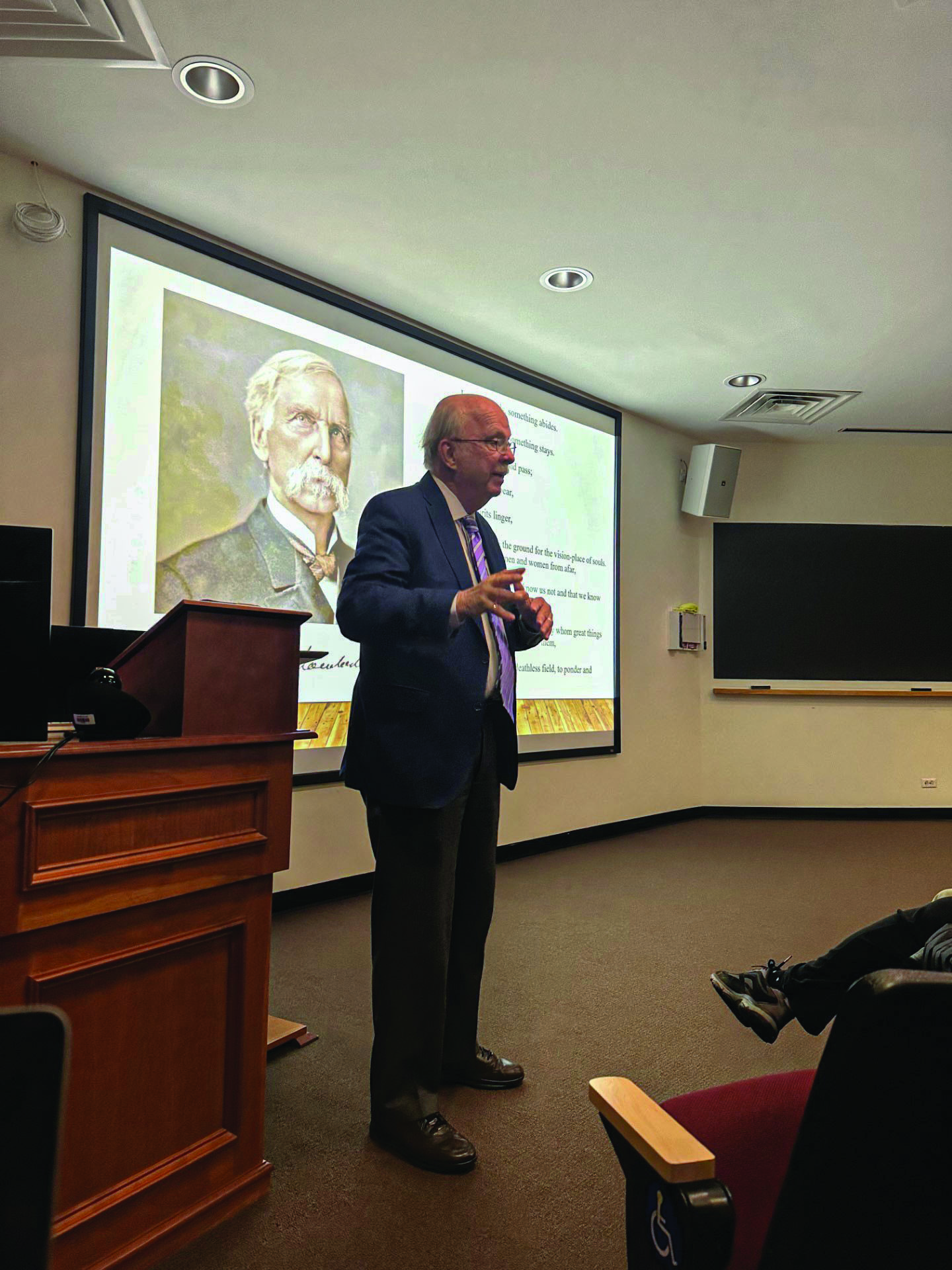Historian Ronald White Lectures on recent book “On Great Fields: The Life and Unlikely Heroism of Joshua Lawrence Chamberlain”
November 10, 2023
 Julia Demeny
Julia DemenyAmerican historian and author Ronald C. White visited Bowdoin on Wednesday evening to lecture on his recent book, “On Great Fields: Joshua Chamberlain: The Life and Unlikely Heroism of Joshua Lawrence Chamberlain.” White’s book is the first major comprehensive biography of Joshua Chamberlain in 30 years.
White began his talk with the words, “You know the story.”
“The story” refers to Joshua Chamberlain’s revered heroism in the Battle of Gettysburg as he led his regiment to victory at Little Round Top. While this is Chamberlain’s renowned achievement, White’s book aims to consider Chamberlain beyond his role as a Civil War hero.
“Understandably, the focus has been on Gettysburg,” White said. “What I want to suggest this evening is that’s kind of a zoom-lens.… We need a wide-angle lens.”
White went on to describe the many vocations that Chamberlain had throughout his life: general, Bowdoin professor, governor, president of the College, writer and speaker.
“Those dimensions are [why I] find him so compelling, and controversial,” White said.
White centered on aspects of Chamberlain’s identity less commonly discussed than his courage at Little Round Top. He spoke about Chamberlain’s formative years, his ideology coming from a congregational church, his studies at Bangor Theological Seminary, his views on necessary changes to Bowdoin’s teaching methods and curriculum—namely, the incorporation of science—and his relationship with his wife, Fanny.
The talk was co-hosted by the history department and the Pejepscot History Center (PHC), an organization that aims to investigate and share the history of Brunswick, Topsham and Harpswell.
PHC Director Larissa Vigue Picard recalled the center’s experience with White’s research and how Chamberlain is a key part of their own archives.
“[The PHC] worked with Ron extensively as he researched the book—going back five years—because we have a large archive about Chamberlain and, of course, own the Joshua L. Chamberlain Museum that includes objects such as his Gettysburg boots and his horse’s saddle,” Vigue Picard wrote in an email to the Orient.
White’s research went even deeper into Chamberlain’s role in Brunswick, as he researched Chamberlain’s time at Bowdoin extensively.
“[White] spent lots of time researching at Bowdoin as well, naturally, and talking with Bowdoin’s Secretary of the College (and de facto historian of the college), John Cross, who knows an encyclopedic amount about Chamberlain, as well as researching at many other archives,” Vigue Picard wrote.
Professor of History Patrick Rael also commented on the ways in which Bowdoin is intertwined with Chamberlain to this day.
“In many ways, Chamberlain is central to Bowdoin’s identity. As a student, professor and president of the College, he may be considered a Polar Bear par excellence,” Rael wrote. “Reflecting on his career and his words reminds [us] of how different, as well as how similar college life was 150 years ago. Chamberlain himself, as president of the College, confronted an era of rapidly changing technology that was quickly reformulating what it meant to go to college. Learning from Chamberlain’s life can help the Bowdoin community as it continues to confront squarely the many challenges of an increasingly complex society.”
A large portion of White’s talk focused on Chamberlain’s role in diffusing an 1880 uprising in Augusta, when insurgents stormed Maine’s Capitol to dispute the winner of the gubernatorial election. The state government was on the verge of collapse, and Chamberlain had been appointed as a military governor for 12 days. Chamberlain risked his own safety to appease the masses, and White recounted what Chamberlain said to the crowd, delivering these words:
“‘I’m here to preserve the peace and honor of the state until the right government is seated. Whichever it may be, it’s not for me to say, but it is for me to see that the laws of the state are put into effect without fraud, without force, but with call thought and sincere purpose. I’m here for that, and I shall do it,’” White quoted Chamberlain.
Opening his coat, Chamberlain declared, “If anybody wants to kill me, here I am. Let him kill!”
The masses in Augusta went silent, and the crowd dispersed.
Although this story of Chamberlain is not “the story,” White regards it as critical to understanding Chamberlain.
“I think the 12 days in January 1880 may have been Chamberlain’s finest hour. Little Round Top had happened spontaneously in 90 minutes. This happened over 12 days in Augusta and took much more calculation,” White said.
After discussing this courageous—yet relatively unknown—feat of Chamberlain’s, White closed with a question for the audience.
“I don’t think [Chamberlain’s] is simply a nineteenth-century story. I don’t think it’s simply a Civil War story. At its heart, it poses a question with many possible answers. What makes a hero? What background? What behavior? What beliefs? What circumstances? What records? What outcomes?” he asked. “I turn that question over to you.”

Comments
Before submitting a comment, please review our comment policy. Some key points from the policy: